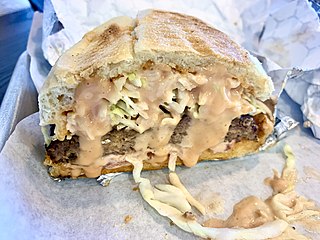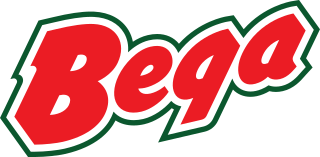
The economy of the Bahamas is dependent upon tourism and offshore banking. The Bahamas is the richest country in the West Indies and is ranked 14th in North America for nominal GDP. It is a stable, developing nation in the Lucayan Archipelago, with a population of 391,232 (2016). Steady growth in tourism receipts and a boom in construction of new hotels, resorts, and residences had led to solid GDP growth for many years. The slowdown in the Economy of the United States and the September 11 attacks held back growth in these sectors from 2001 to 2003.

A grocery store (AE), grocery shop (BE) or simply grocery is a foodservice retail store that primarily retails a general range of food products, which may be fresh or packaged. In everyday U.S. usage, however, "grocery store" is a synonym for supermarket, and is not used to refer to other types of stores that sell groceries. In the UK, shops that sell food are distinguished as grocers or grocery shops.

Horlicks is a sweet malted milk hot drink powder developed by founders James and William Horlick. It was first sold as "Horlick's Infant and Invalids Food", soon adding "aged and travellers" to their label. In the early 20th century, it was sold as a powdered meal replacement drink mix.

Soy milk, also known as soya milk or soymilk, is a plant-based drink produced by soaking and grinding soybeans, boiling the mixture, and filtering out remaining particulates. It is a stable emulsion of oil, water, and protein. Its original form is an intermediate product of the manufacture of tofu. Originating in China, it became a common beverage in Europe and North America in the latter half of the 20th century, especially as production techniques were developed to give it a taste and consistency more closely resembling that of dairy milk. Soy milk may be used as a substitute for dairy milk by individuals who are vegan or lactose intolerant.

Latin American cuisine is the typical foods, beverages, and cooking styles common to many of the countries and cultures in Latin America. Latin America is a highly racially, ethnically, and geographically diverse with varying cuisines. Some items typical of Latin American cuisine include maize-based dishes arepas, empanadas, pupusas, tacos, tamales, tortillas and various salsas and other condiments. Sofrito, a culinary term that originally referred to a specific combination of sautéed or braised aromatics, exists in Latin American cuisine. It refers to a sauce of tomatoes, roasted bell peppers, garlic, onions and herbs. Rice, corn, pasta, bread, plantain, potato, yucca, and beans are also staples in Latin American cuisine.

Canadian cuisine consists of the cooking traditions and practices of Canada, with regional variances around the country. First Nations and Inuit have practiced their culinary traditions in what is now Canada since at least 15,000 years ago. The advent of European explorers and settlers, first on the east coast and then throughout the wider territories of New France, British North America and Canada, saw the melding of foreign recipes, cooking techniques, and ingredients with indigenous flora and fauna. Modern Canadian cuisine has maintained this dedication to local ingredients and terroir, as exemplified in the naming of specific ingredients based on their locale, such as Malpeque oysters or Alberta beef. Accordingly, Canadian cuisine privileges the quality of ingredients and regionality, and may be broadly defined as a national tradition of "creole" culinary practices, based on the complex multicultural and geographically diverse nature of both historical and contemporary Canadian society.

PepsiCo, Inc. is an American multinational food, snack, and beverage corporation headquartered in Harrison, New York, in the hamlet of Purchase. PepsiCo's business encompasses all aspects of the food and beverage market. It oversees the manufacturing, distribution, and marketing of its products. PepsiCo was formed in 1965 with the merger of the Pepsi-Cola Company and Frito-Lay, Inc., PepsiCo has since expanded from its namesake product Pepsi Cola to an immensely diversified range of food and beverage brands. The largest and most recent acquisition was Pioneer Foods in 2020 for US$1.7 billion and prior to it was buying the Quaker Oats Company in 2001, which added the Gatorade brand to the Pepsi portfolio and Tropicana Products in 1998.
The foodservice or catering industry includes the businesses, institutions, and companies which prepare meals outside the home. It includes restaurants, grocery stores, school and hospital cafeterias, catering operations, and many other formats.

Fazer is one of the largest corporations in the Finnish food industry. The company was founded by Karl Fazer in 1891, as a "French-Russian confectionery" in central Helsinki. Today, it employs over 6,000 people across Finland, Sweden, Latvia, Lithuania, Estonia, Denmark, Norway and Poland. Its products are exported to more than 40 countries.

High-fructose corn syrup (HFCS), also known as glucose–fructose, isoglucose and glucose–fructose syrup, is a sweetener made from corn starch. As in the production of conventional corn syrup, the starch is broken down into glucose by enzymes. To make HFCS, the corn syrup is further processed by D-xylose isomerase to convert some of its glucose into fructose. HFCS was first marketed in the early 1970s by the Clinton Corn Processing Company, together with the Japanese Agency of Industrial Science and Technology, where the enzyme was discovered in 1965.

Dominican cuisine is made up of Spanish, indigenous Taíno, Middle Eastern, African, Cuban, Puerto Rican and Haitian influences. The most recent influences in Dominican cuisine are from the British West Indies and China.

Established in 1897, Franklin Baker Company is a manufacturer and exporter of desiccated and processed coconut products in the U.S. and abroad. The company manufactures the retail coconut brand Baker's Coconut.
Azerbaijani cuisine is the cooking styles and dishes of the Republic of Azerbaijan. The cuisine is influenced by the country's diversity of agriculture, from abundant grasslands which historically allowed for a culture of pastoralism to develop, as well as to the unique geographical location of the country, which is situated on the crossroads of Europe and Asia with access to the Caspian Sea. The location has enabled the people to develop a varied diet rich in produce, milk products, and meat, including beef, mutton, fish and game. The location, which was contested by many historical kingdoms, khanates, and empires, also meant that Azerbaijani cuisine was influenced by the culinary traditions of multiple different cultures, including Turkic, Iranian, and Eastern European.
GraceKennedy Limited is one of the Caribbean's largest conglomerates, with several diversified companies in the Caribbean, Europe and North America.

The economy of Antigua and Barbuda is service-based, with tourism and government services representing the key sources of employment and income. Tourism accounts directly or indirectly for more than half of GDP and is also the principal earner of foreign exchange in Antigua and Barbuda. However, a series of violent hurricanes since 1995 resulted in serious damage to tourist infrastructure and periods of sharp reductions in visitor numbers. In 1999 the budding offshore financial sector was seriously hurt by financial sanctions imposed by the United States and United Kingdom as a result of the loosening of its money-laundering controls. The government has made efforts to comply with international demands in order to get the sanctions lifted. The dual island nation's agricultural production is mainly directed to the domestic market; the sector is constrained by the limited water supply and labor shortages that reflect the pull of higher wages in tourism and construction. Manufacturing comprises enclave-type assembly for export with major products being bedding, handicrafts, and electronic components. Prospects for economic growth in the medium term will continue to depend on income growth in the industrialized world, especially in the US, which accounts for about one-third of all tourist arrivals. Estimated overall economic growth for 2000 was 2.5%. Inflation has trended down going from above 2 percent in the 1995-99 period and estimated at 0 percent in 2000.
Reed's Inc. is a US-based company that manufactures soft drinks and candies. The company was founded by Christopher J. Reed in 1989. It was originally based in Los Angeles, California, but moved its headquarters to Norwalk, Connecticut, in September 2018.
The National Petroleum Marketing Company, better known by its brand name National Petroleum (NP), is a state-owned refined petroleum distribution and marketing company owned by the government of Trinidad and Tobago. From its inception in 1972 until 1999, NP was the sole government-authorized distributor of gasoline, diesel fuel, and other consumer refined petroleum products in the island nation. The company has since expanded into lubricants, liquified petroleum gas, aviation fuel, and bunker fuel.

The Bega Group is an Australian diversified food and drinks company with manufacturing sites in New South Wales, Queensland, Western Australia and Victoria. Founded as an agricultural cooperative in the town of Bega, New South Wales by their dairy suppliers, it became a public company in 2011 when it listed on the Australian Securities Exchange. Close to half of shares publicly traded are still held by Bega's farmer-suppliers. It is currently one of the largest companies in the dairy sector in Australia, with a base milk supply in 2018 of approximately 750 million litres per annum.













